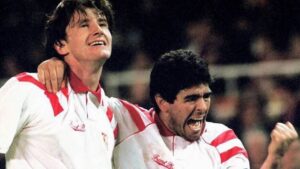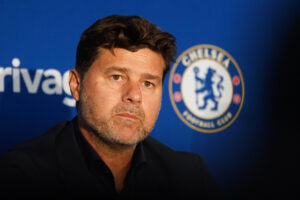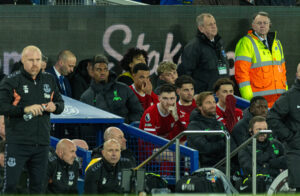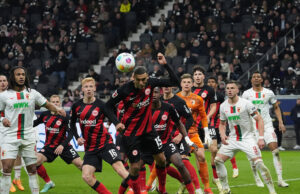Welcome back to the latest series of articles from Last Word On Football. This time we look back on the footballers who many class as Premier League legends. Players who wowed the crowd, frustrated the opposition, scored great goals and inspired their team to glory.
Today we look at a player who captained his side to glory in every competition they played in. A hard man who never shirked a challenge and wore his heart on his sleeve as he inspired those around him and in the stands. And, of course, controversy was never far behind.
Roy Keane: A Premier League Legend
Where it All Began: Nottingham Forest and Brian Clough
Roy Keane began his career in Ireland with Cobh Ramblers. However, a scout at a youth game brought him to the attention of the legendary Brian Clough. A successful trial in the summer of 1990 followed at Nottingham Forest and the 19-year-old Irishman was soon on his way to England.
Clough, not one to shy away from giving youngsters a chance if he thought they were good enough, gave Keane his debut against Liverpool at the beginning of the 1990/91 season. The youngster soon became a regular at the City Ground and a firm favourite with Clough.
The Forest manager may have been coming to the end of his great managerial career, but he was still producing the hairdryer treatment to his squad if needed. Keane was one of the few that would be let off from such treatment. After yelling at several players for not performing up to standards, Clough would get to Keane and simply say “I love you Irishman.”
Keane thrived under the tutelage of Clough, becoming Forest’s key player. In his three seasons at the club, Keane played 154 games, scoring 33 goals. One stat that may surprise many is that Keane was never sent off while at Forest. In later years, Clough had his own opinions on this.
“When he worked for me, he never used to say a word, but forced out a half-smile whenever he saw me because he knew I had his number. I rated him very highly as a player, but wouldn’t stand any nonsense.”
His performances attracted interest with some of England’s biggest clubs wanting to take him away from Forest. With Clough retiring and Forest relegated from the Premier League, it was time for Keane to move on.
Transfer to Manchester United
In 1993, Roy Keane transferred to English giants Manchester United. However, the deal almost never happened with the midfielder close to ending up at big-spending Blackburn Rovers.
Rovers manager Kenny Dalglish had money to spend and wanted Keane to join his expensively-assembled squad. Both met and it was agreed that the Irishman would move to Blackburn. There was one issue, though. As the deal was agreed late on a Friday evening, no contract was available, therefore, a simple handshake was enough to seal the deal – or so Dalglish believed.
United manager Alex Ferguson was awaiting official permission from Forest to speak to his number one target, finally speaking to Keane the day before the player was expected to sign for Rovers. Ferguson convinced the youngster to meet him the next day. The rest, as they say, is history. Keane agreed there and then to sign for Ferguson and United. Dalglish was, understandably, furious.
Successful Beginning to Life at United
Life at United was as successful as expected for Roy Keane, with a club back in the habit of winning trophies. Keane’s first four seasons produced two League and FA Cup doubles and a third league title.
It also included a runners-up place in the Premier League where they were beaten to the title by Blackburn and a runners-up medal in the FA Cup. Keane was now an established star at Old Trafford and with many youngsters coming through, he was also one of the most experienced. The United captaincy was on it’s way to him.
Captain Fantastic
Following the unexpected retirement of Eric Cantona, Keane was the perfect replacement for the brilliant but controversial Frenchman. Being captain came naturally to Keane.
The inspirational midfielder would constantly rally his troops on the field while also covering every blade of grass himself and leading by example. Keane, on many occasions, took control of a game himself in a bid to win. Scoring, assisting and winning tackles all over the field would be the norm for him and United’s fans.
Keane’s Finest Hour
Arguably, the game which sums up why he was captain fantastic was the Champions League semi-final away at Juventus. The two teams drew 1-1 at Old Trafford and, although Juventus were considered favourites to reach the final, United, and especially Keane, were not about to give up on their European Cup final dream.
United were 2-0 down inside 11 minutes and an apparent miracle was now required. Defender Wes Brown, who was on the bench that night, said of Keane: “He went into Terminator mode”. The captain pulled a goal back but then disaster struck. A yellow card meant Keane would miss the final. However, he used this to almost singlehandedly get his team to the final. United and captain Keane turned the game around and won 3-2 to book their place in the final for the first time since 1968.
Manager Alex Ferguson summed up Keane’s display: “It was the most emphatic display of selflessness I have seen on a football field. Pounding over every blade of grass, competing as if he would rather die of exhaustion than lose, he inspired all around him. I felt it was an honour to be associated with such a player.”
Glory Glory at Man United
Roy Keane was a winner and this is proved by the trophies he won at the Theatre of Dreams. In 12 years, he won seven Premier League titles, four FA Cups, one Champions League, one Intercontinental Cup and four Community Shields. His career was also littered with individual awards.
When Keane left United in 2005, Alex Ferguson issued a statement, describing Keane as “the best midfield player in the world of his generation” and “one of the great figures in our club’s illustrious history.”
Keane left Old Trafford having made 480 appearances and scoring 51 goals.
Controversy Never Far Away
Keane’s Premier League career was one of the most successful any player has ever had, however, he was also involved in some high profile controversies.
In 1997, Keane, having just been handed the United captaincy, went to challenge Leeds United’s Alf-Inge Håland. The tackle would leave Keane badly injured and he was out of the game for the rest of the season.
Håland stood over Keane and accused him of feigning injury and trying to hurt him. Several years later, the pair met in the Manchester derby and near the end of the game, Keane went in knee-high on the City player. A suspension and a fine came Keane’s way.
United’s fans were also not exempt from Keane’s wrath: “Away from home our fans are fantastic, I’d call them the hardcore fans. But at home, they have a few drinks and probably the prawn sandwiches, and they don’t realise what’s going on out on the pitch. I don’t think some of the people who come to Old Trafford can spell football, never mind understand it.”
Keane was also never one to shy away from confrontations with opposition players and also his national team manager. The United captain, believing he was seeing Gary Neville being bullied in the tunnel before an away game at Arsenal, stood up for his teammate. He squared up to Arsenal’s Patrick Viera with referee Graham Poll having to step in.
During the build-up to the 2002 World Cup, Keane left the Republic of Ireland squad before the competition began. He was not happy with his side’s preparations. It led to a furious row with manager Mick McCarthy and Keane headed home.
Management
Soon after Keane’s playing career came to an end, he was in demand to take his first steps into management. Sunderland, struggling in the Championship after relegation from the Premier League, turned to Keane.
His former Republic of Ireland teammate, Niall Quinn, now chairman and caretaker manager at the Stadium of Light, convinced Keane to take the job. It proved to be an inspired appointment. He took Sunderland from being relegation candidates to champions in the same season. It earned him the Championship Manager of the Year award and he successfully kept the Black Cats in the Premier League before stepping down in late 2008.
In April 2009, Roy Keane was appointed the new manager of Championship side Ipswich Town. He had hoped to bring the same magic to Portman Road that saw him take Sunderland to the Premier League. Sadly it was not to be and he left Ipswich in January 2011.
Ipswich Town would be Keane’s last manager role. He has been assistant at Aston Villa, Nottingham Forest and for the Republic of Ireland. He has since gone on to be a successful, if occasionally controversial, pundit.
Main Photo






